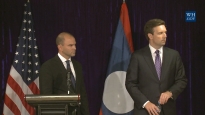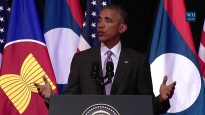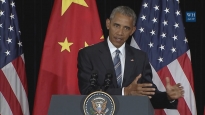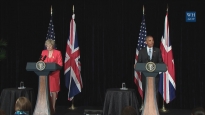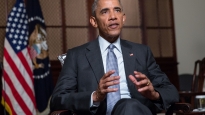President Obama on Education at TechBoston
March 08, 2011 | 23:00 | Public Domain
President Obama Speaks on winning the future through education at TechBoston Academy in Massachusetts.
Remarks by the President on Winning the Future in Education in Boston, Massachusetts
TechBoston Academy
Boston, Massachusetts
3:44 P.M. EST
THE PRESIDENT: Hey! (Applause.) Hello, TechBoston! (Applause.) Thank you. Thank you so much. Thank you, everybody. Thank you, everybody. Everybody please have a seat. Everybody please have a seat.
We are thrilled to see especially the students here today. (Applause.) I am grateful for the presence of a few other outstanding leaders. First of all, the great mayor of Boston Tom Menino is in the house. There he is over there. (Applause.) Lieutenant Governor Tim Murray is here. Where’s Tim? (Applause.) Tim, good to see you. The outstanding Secretary of Education Arne Duncan is in the house. (Applause.)
To all of you who are contributing to the outstanding education of these young people, I could not be prouder to be here. It is wonderful to be back in Massachusetts. Some of you may know I spent some time in school here myself. I was much younger. I had no gray hair. (Laughter.) There were definitely no SmartBoards back then. (Laughter.) The most exciting new technology was an electric pencil sharpener. (Laughter.) So times have changed. You remember those? (Laughter.) Do you know what pencils are? Do you guys use pencils?
I am so grateful to have Melinda Gates joining us here today. Of course, we all know Melinda’s husband Bill, who couldn’t hack it at school here, dropped out. (Laughter.) Then he started a modest -- modestly successful computer company. That was a joke, guys. (Laughter.) Bill Gates actually created a really big company. (Laughter.) But Melinda is a force in her own right -- she is one of the world’s most generous but also effective philanthropists, successful businesswoman, and most important for today, she has been an extraordinary leader when it comes to education reform. Microsoft and the Gates Foundation have been partners with TechBoston since it got started, and we are very grateful for their support. Proud of them. (Applause.)
Melinda is absolutely right, by the way. One of the things that I’ve benefited from in this effort to make sure our schools are working for every young person is my Secretary of Education. Some of you might have known that Arne used to play professional basketball in Australia. He was on the Harvard basketball team; was a star there. Just the other week, he was in a celebrity basketball tournament where he was outscored by Justin Bieber. (Laughter.) I’m just saying. (Laughter.) Justin is, like, about 5’2” -- (laughter) -- so please give him a hard time for that if you get a chance.
Now, we’re in the middle of what we’re calling Education Month at the White House, and I wanted to come to TechBoston so that the rest of America can see how it’s done. You guys are a model for what’s happening all across the country. (Applause.) And obviously at the helm is Mary Skipper, who is doing unbelievable work. (Applause.)
AUDIENCE MEMBER: We love you, Skip!
THE PRESIDENT: Love you, Skip! (Laughter.) But also the extraordinarily talented teaching staff that is working here. I had a chance to meet a couple of the teachers, and you could just tell that they are passionate about the work that they do. So they deserve a huge round of applause. (Applause.)
Every day, TechBoston is proving that no matter who you are, or what you look like, or where you come from, every child can learn. Every child can succeed. And every child deserves that chance.
Getting the best possible education has never been more important than it is right now. And that’s because in today’s world, a good job requires a good education. I travel all across the country, I go into factories, I go into companies. And it doesn’t matter where you are working -- if you do not have a good education you are not going to be able to succeed. And that includes being on the factory floor these days, because most of the equipment is highly technical.
Over the next 10 years, nearly half of all new jobs will require a level of education beyond a high school degree. Which means, obviously, first of all, you can’t drop out of TechBoston. That’s not allowed. All right? You can’t even think about dropping out. (Applause.) But -- can’t even think about it. But even after you graduate, you’re going to need some additional education. And I know that TechBoston is doing an outstanding job of making sure that every student is prepared to go to college.
Unfortunately, the reality is too many students are not prepared across our country. Too many leave school without the skills they need to get a job that pays. Today, as many as a quarter of American students are not finishing high school -- a quarter. The quality of our math and science education lags behind many other nations. And America has fallen to ninth in the proportion of young people with a college degree. We used to be number one, and we’re now number nine. That’s not acceptable.
The most effective way to create jobs in this country is to change those statistics. There’s no better economic policy than one that produces more graduates with the skills they need to succeed -- to start their own businesses, to create their own Microsoft, to create new industries. And that’s why reforming education is the responsibility of every single American -– every parent, every teacher, every business leader, every public official, and yes, every student.
Now, it used to be that we weren’t sure how to turn around failing schools. We weren’t sure what worked to help struggling students. There were some folks in Washington who said all it took was more money, and if we just poured more money into the school everything would better. Then there were others who said, no, you just got to blow up these schools, they can’t work. A lot of people thought we should just give up on places like Dorchester, and they assume that some kids just can’t learn, or they’ve got too many disadvantages. There are always some excuses for why our young people couldn’t succeed.
But after awhile, parents and teachers and education reformers started to realize that maybe Washington didn’t have all the answers. And I can promise you after being there for a few years, they’re on to something there. (Laughter.) People started realizing that what’s needed is not either/or, it’s not either more money or more reform, it’s both/and -- both more money and more reform. That’s what’s needed. (Applause.)
What’s needed is higher standards and higher expectations; more time in the classroom and greater focus on subjects like math and science. What’s needed are outstanding teachers and leaders like Skip who get more flexibility. I just like that name. I’m going call you Skip now. (Laughter and applause.) But education leaders who get more flexibility in exchange for more accountability.
And all those ingredients are present here at TechBoston. The students here, they get their own laptop when they walk through the door. That costs money, but it opens up a window for learning. You’re required to take four years of math, science and technology classes -- classes like web development and entrepreneurship and even forensic science. I didn’t even know what forensic science was in high school. (Laughter.) I’m not sure I do now. (Laughter.) But that’s part of the requirement that makes this school outstanding.
The school days are longer. Classes are 60 minutes so that young people have time to actually focus and absorb the information that’s being provided. And many students go to school in July and August. I usually don’t get much applause from students when I point that out. (Laughter.) Because this is a pilot school, Mary had the ability to hire her own staff, and the teachers here are offered training and constant support.
So those are the ingredients, and the results have been powerful. The students here come from some tough neighborhoods -- am I right? Yes. And yet the graduation rate is almost 20 points higher than the rest of the city -- 20 points higher. (Applause.) Ninety-four percent of the most recent graduating class went to college. Eighty-five percent of those students were the first in their family to do so. (Applause.) Your math and science scores are consistently higher than other Boston schools, and the attendance rate here is 94 percent.
So it’s working. What’s happening here is working. We know what works. What’s required, then, to get results from any school is no longer a mystery. And that means there can’t be any more excuses -- from anybody. As a nation, we have a moral and economic imperative to give every child the chance to succeed. And that’s why I set a goal when I took office, that by the end of the decade, America will once again have the highest proportion of college graduates in the world. We will be number one again. (Applause.)
Now, to achieve this goal, everybody is going to need to do their part. We need the help of philanthropists like Melinda Gates. We’ll need the help of the businesses that are partnering with TechBoston. We need citizens and parents to get involved, because nothing we do in school with make much of a difference unless we instill in our kids the self-confidence and the self-discipline and the work ethic that are at the heart of success not just in school but in life.
So some of you may have come from a tough neighborhood, but you’ve got some parents at home, you’ve got somebody at home who’s nagging you and staying on top of you and saying you can succeed. And I’m assuming somebody who’s also turning off the TV set once in a while and saying, put away the video games and do your homework. That has to be a critical ingredient in success.
We need to recognize that the true path to reform has to involve partnerships between teachers and school administrators and communities. And we’ll need a national education policy that tries to figure out how do we replicate success stories like TechBoston all across the country.
So that’s what Arne Duncan’s job is, and that’s what he’s been doing so well over the last few years. Instead of pouring money into a broken system, under Arne’s leadership, what we’ve done is we’ve launched a competition. We call it Race to the Top. (Applause.) We call it Race to the Top, and it’s basically a challenge to states and school districts, prove to us that you’re serious about reform. We’ve said to all 50 states, if you show us the most innovative plans for improving teacher quality and improving student achievement, then we’ll show you the money. And for less than 1 percent of what America spends on education each year, Race to the Top has led over 40 states to raise their standards for teaching and learning -- standards, by the way, that were developed not in Washington but by Republican and Democratic governors all across the country.
So at the grassroots level, at the state level, standards were developed. And we said, show us how you’re going to meet these standards. The more innovative you are, the more money you can get for your schools. And that’s the kind of bottom-up approach that we need to follow. This year we’re going to have to work with Congress to fix No Child Left Behind, and we’re going to have to replace it with a law that does a better job focusing on responsibility and reform and, most of all, results. (Applause.)
We’re also trying to give school districts more flexibility to open charter schools and pilot schools like TechBoston, so that they have the flexibility, the autonomy, to do what’s best for students. We’re working to make sure every school has a 21st-century curriculum like you do. And in the same way that we invested in the science and research that led to the breakthroughs like the Internet, I’m calling for investments in educational technology that will help create digital tutors that are as effective as personal tutors, and educational software that’s as compelling as the best video game. I want you guys to be stuck on a video game that’s teaching you something other than just blowing something up. (Applause.)
And because we know that the single most important factor in a student’s success after their parent is the person standing at the front of the classroom, we are looking to make teaching one of the most honored professions in our society. (Applause.) In South Korea, teachers are known as “nation builders.” That’s what they’re -- that’s how they’re described. Here in America, it’s time we treated the people who educate our children with the same level of respect. (Applause.) We’ve got to lift up teachers. We’ve got to reward good teachers. First, we also have to stop making excuses for bad teachers. We’re also working to give educators the support and the preparation that they need, and I know that some of the teachers here have benefited from our investment in these programs, such as the teacher preparation partnership you have with the Boston Teachers Residency and with UMass Boston.
And with so many baby boomers retiring from teaching over the next few years, we intend to recruit and prepare a new generation of teachers, including 100,000 new math and science teachers over the next decade. And I hope that some of you will end up going into the teaching profession and pass on all the knowledge that you’ve gotten here at TechBoston. (Applause.)
Now, I’ve talked about how much we can improve student achievement through various reforms -- setting higher standards, higher expectations; giving schools and teachers more flexibility in exchange for greater accountability. But it’s also true that fixing our schools will cost some money. Recruiting and rewarding the best teachers costs money. Making it possible for families to send their kids to college costs money. Making sure that some of the state-of-the-art equipment that all of you are working on when I walked into Mr. Louis’s classroom today, that costs money.
Making these investments in education is going to be absolutely critical, but it’s tough to do after decades of deficits. I understand that. For too long, the government has been spending more money than it’s been taking in. So we’re going to have to get serious about cutting whatever spending we don’t need, which means I’ve already called for a five-year freeze in our annual domestic budget. That’s a freeze that would cut the deficit by more than $400 billion over the next decade, and it would bring such spending to a lower share of our economy than it’s been in 50 years. And I’ve proposed cutting or eliminating more than 200 federal programs that aren’t working as well as they should. We’re freezing the salaries of hardworking civil servants for two years. And I’m willing to do more to get our deficits under control. And that’s why the White House is leading bipartisan meetings with members of Congress, because we need to come up with a budget that forces government to live within its means.
But -- and I want everybody to pay attention -- even as we find ways to cut spending, we cannot cut back on job-creating investments like education. We cannot cut back on the very investments that will help our economy grow and our nation compete and make sure that these young people succeed. (Applause.) There’s nothing responsible about that. There’s nothing responsible about cutting back on our investment in these young people.
I mean, think about what happens in your own family. If you have a family member that loses a job or you have an illness in the family and you’ve got to cut back, where do you start? You maybe give up a vacation. You go out to eat less often. Maybe you don’t buy that new coat you thought was sharp, or the new car that you thought you needed. But the last thing you do is give up saving on your child’s education, because you know that’s the key to that child’s success in life.
Well, what’s true for a family has to be true for the larger American family. A budget that sacrifices our commitment to education is a budget that sacrifices our country’s future. It is a budget that sacrifices our children’s future, and I will not let it happen. (Applause.) I will not let it happen. We’re not going to give up on any school in America or any child in America.
We can’t forget that every year, schools like TechBoston have to hold a lottery, because there just aren’t enough spaces for all the students who want to go here. The reason they want to go here is because they know that if they go to some of the other schools in the area, they won’t do as well. They know that they might drop out. They might not get the same reinforcement that they need. There might not be that same culture of excellence and performance. That means they may not go to college, and they know they may not succeed.
All of that shouldn’t depend on a lottery. That can’t be the system of education we settle for in America. No child’s chance in life should be determined by the luck of a lottery. Not in this country. This is a place where everyone gets the chance to succeed, where everybody should have a chance to make it. The motto of this school is, “We rise and fall together.” Well, that is true for America as well. (Applause.) That’s true for America as well.
If we want to prosper in the 21st century, and if we want to keep the American Dream alive in our time, then we’re going to rise together. We’ve all got to come together. We’ve got to give our children the same world-class education that you are getting right here at TechBoston. And as long as I am President, that’s what I’m going to be fighting for right alongside you.
Thank you so much, everybody. (Applause.) God bless you. God bless the United States of America.
END
4:07 P.M. EST
|
September 6, 2016
|
September 6, 2016
|
September 6, 2016
|
September 5, 2016
|
|
September 4, 2016
|
September 4, 2016
|
September 3, 2016
|
September 1, 2016
|
- &lsaquo previous
- …
- 25
- 26
- 27
- 28
- 29
- 30
- 31
- 32
- 33
- …
- next &rsaquo
